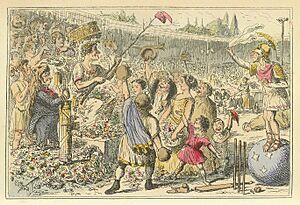Isthmian Games facts for kids
The Isthmian Games were one of the four big sports festivals in Ancient Greece. They were held near the city of Corinth, on a narrow strip of land called the Isthmus of Corinth. These games were named after this place.
Like the Nemean Games, the Isthmian Games happened every two years. They took place in the years before and after the famous Olympic Games. The Pythian Games were held in the third year of this four-year cycle.
Contents
The Games' Beginning
People believed the Isthmian Games started as special events to honor someone who had died. These were called "funeral games." One story says they began for a boy named Melicertes (also known as Palaemon).
A Mythical Start
Sisyphus, a legendary king of Corinth, supposedly found Melicertes' body. He buried it on the Isthmus and started these games to remember him. Later, during Roman times, people still honored Melicertes in this area.
Another story says that Theseus, a famous king from Athens, made the games bigger. He changed them from a small, secret event into a large sports festival. This new festival honored the sea god Poseidon. It was open to all Greeks and became popular enough to compete with the Olympic Games. Theseus even arranged for Athenians visiting the games to get special front seats.
Corinth's Role
Some say that Kypselos, a powerful ruler of Corinth in the 7th century BC, brought the games back to their former glory.
How the Games Were Organized
The very first Isthmian Games were held in 582 BC.
Where and When
This big festival included sports and music competitions. It honored the god Poseidon. The games took place in the spring, every second and fourth year of each four-year Olympic cycle. They were held at Poseidon’s special place on the Isthmus of Corinth. This narrow piece of land connected the Peloponnese peninsula with Central Greece. It was easy to reach by land and sea, making it a natural meeting spot.
Who Could Compete
The Isthmian Games were open to all Greeks. They were especially popular with people from Athens. However, people from the city of Elis chose not to attend. Many people also used the games as a way to spread political messages.
Prizes for Winners
Winners at the Isthmian Games received a crown as their prize. At first, until about 400 BC, this crown was made of celery leaves. Later, the crown changed to be made of pine leaves. It was known as the Isthmian pine.
Besides the crown, winners could also be honored with a statue or a special poem called an ode. The city of Athens also gave its victorious athletes 100 drachmas, which was a good amount of money.
Roman Involvement
From 228 BC onwards, Romans were allowed to join the games. In 196 BC, a Roman general named Titus Quinctius Flamininus used the games for a very important announcement. He declared that the Greek states were now free from the control of Macedon.
According to an old account, the stadium was full of people. Flamininus commanded silence with a trumpet. Then, a herald announced: "The Roman people and Senate, and Flamininus, their general... order that Greece shall be free from foreign garrisons, not subject to tribute, and shall live under her own customs and laws."
There was huge cheering and excitement. People threw crowns and garlands at the general. They voted to build statues for him in their cities. They even sent gifts to Rome to show their thanks.
Control of the Games
Since the games began, Corinth had always been in charge of them. But when Corinth was destroyed by the Romans in 146 BC, the games continued. However, the city of Sicyon took over their management.
Corinth was rebuilt in 44 BC by Caesar. Soon after, Corinth got back control of the games. They were then held in Corinth itself. The games did not return to the Isthmus until AD 42 or 43. The games likely continued until the end of the 4th century AD. We don't know exactly when or why they stopped.
Types of Contests
The Isthmian Games had many of the same competitions as the Olympic Games. These included:
- Wrestling, for men only
- Pankration, a mix of wrestling and boxing, for men only
- Chariot racing, for men only
- Boxing, for men only
- Musical and poetical contests, where women were allowed to compete
Famous Winners
Kleitomachos of Thebes was a very famous athlete. He won wrestling, boxing, and pankration all on the same day!
Isthmian Truce
Before the games started, Corinth would announce a special truce. This was a promise of peace. It allowed athletes and visitors to travel safely through Greece to reach the games. For example, in 412 BC, even though Athens and Corinth were at war, Athenians were still invited to the games as usual.
See also
- The Temple of Poseidon at Isthmia
- Category:Ancient Isthmian athletes
 | Delilah Pierce |
 | Gordon Parks |
 | Augusta Savage |
 | Charles Ethan Porter |


